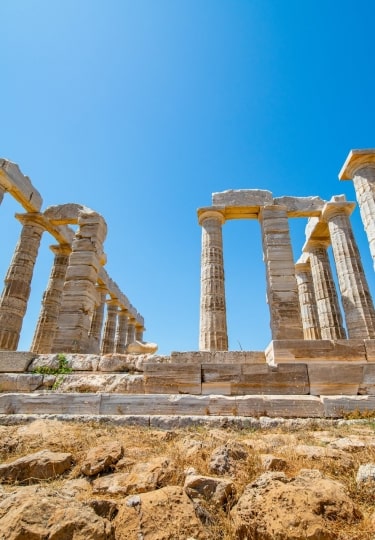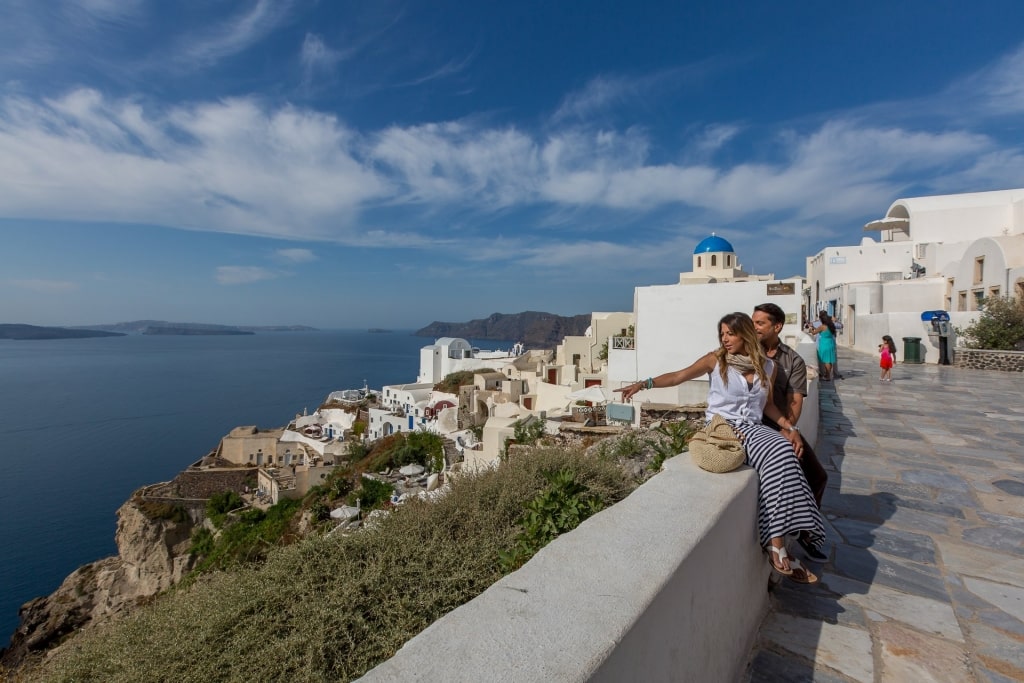Greece is known for being one of the most coveted vacation destinations in the world. This fascinating country’s wonders are almost too numerous to count. Start with the country’s endless coastline, which stretches for nearly 8,500 miles across thousands of dreamy islands and magazine-shoot-ready beaches.
Then, visit the dazzling ancient sites marked by impressive ruins, some that span back more than four millennia of history and reach into the very roots of Western civilization. You can stand in awe of the storied Acropolis in Athens, step into the stadium where the first Olympians competed among the ruins of Olympia, or commune with mythical gods from the island sanctuary of Delos.
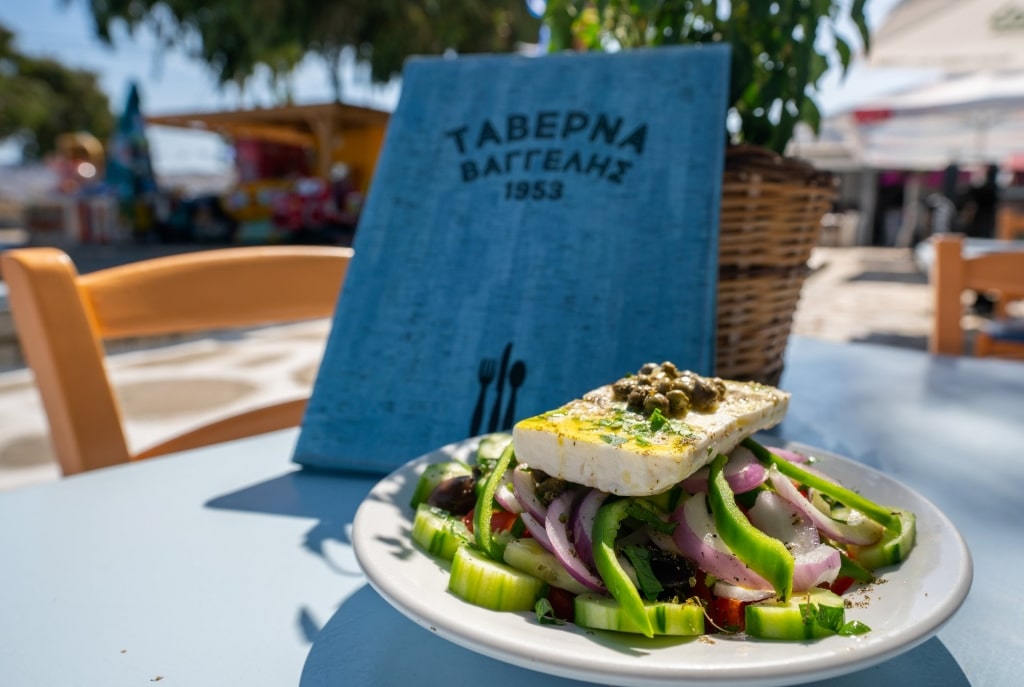
Greek food
There’s also the Mediterranean-inspired Greek cuisine that’s not only delicious but healthy, too. Not to mention a pulsing nightlife scene that spans the traditional “bouzoukia” to modern DJ-spun nightclubs, all of which cater to Greeks’ passion for music and conviviality.
Bonus: Greece enjoys nearly perfect weather year-round with mild temps and sun-kissed blue skies ready to welcome you at any moment.
If you’re planning on visiting this special destination soon, here are some of the top things Greece is known for.
Ancient History and Ruins
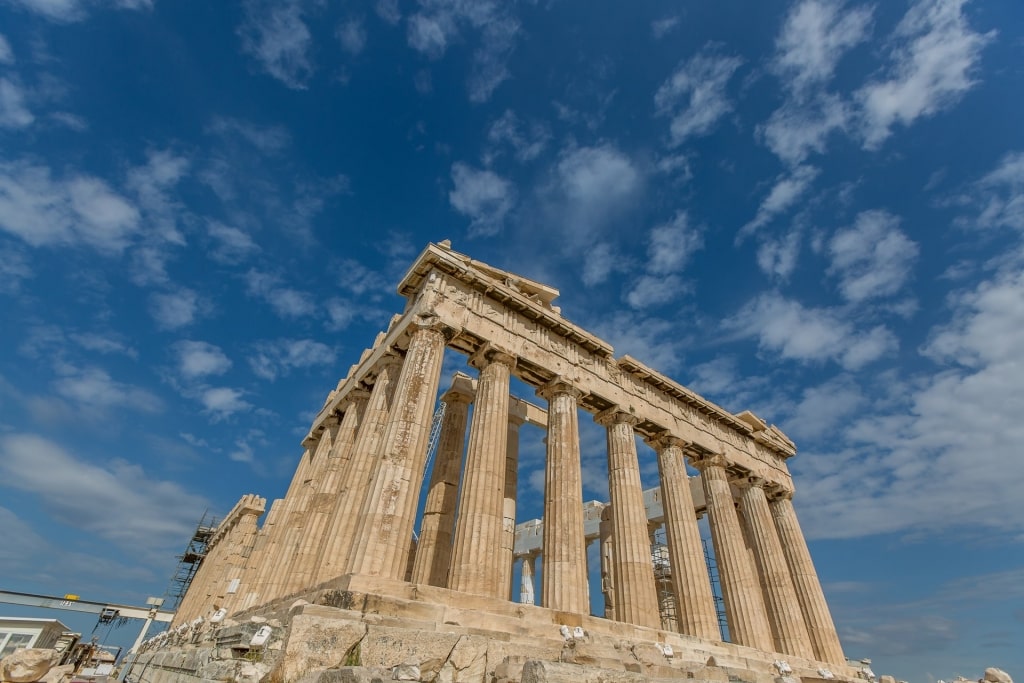
Parthenon in Acropolis, Athens
Greece is commonly referred to as the cradle of Western civilization and for good reason, as one of the things that Greece is known for is its remarkably preserved ruins, as well as its many archaeological museums, like the superb National Archaeological Museum in Athens, which depict ancient architecture, culture, and ways of life that span several millennia of development.
The most famous site, of course, is the Acropolis in Athens. This ancient, rocky hilltop served as the political and sacred foundation of the ancient city and is still very much integrated into the heart of modern Athens today. At its pinnacle is the 2,500-year-old Parthenon temple, one of the most iconic landmarks in Greece, which is dedicated to Athena Parthenos (Athens’s patron goddess), and defined by its distinguished colonnades that stand guard over the capital.
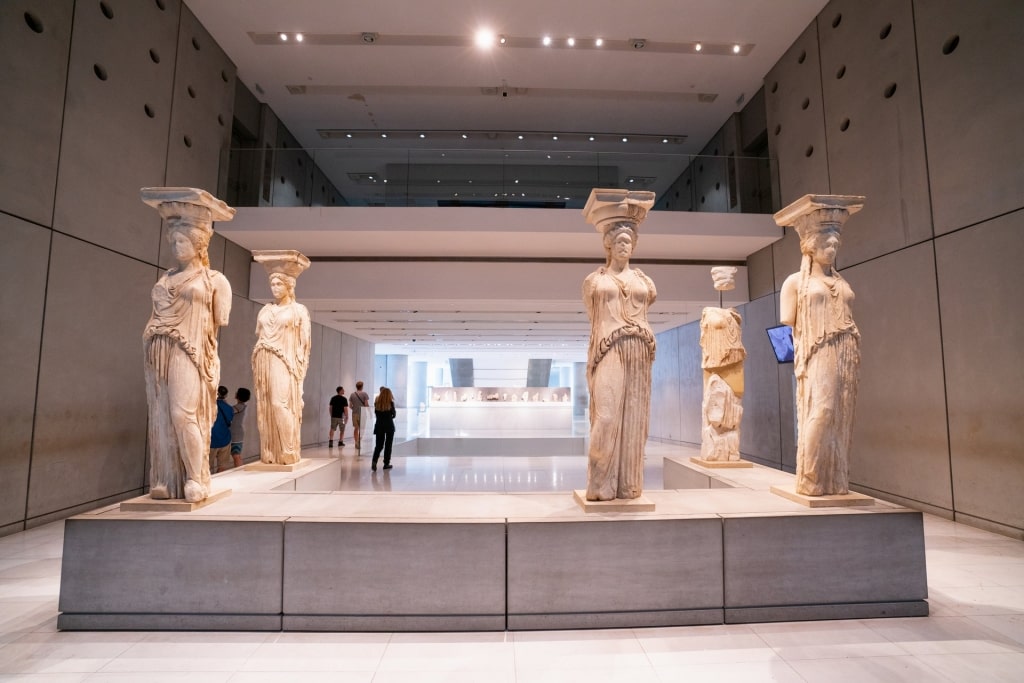
Acropolis Museum, Athens
Other treasures await at the top of the Acropolis, including some smaller temples and the Acropolis Museum, one of the best museums in the world. It’s filled with finds from the surrounding archaeological site including statuary, friezes, and more.
Also at the base of the Acropolis is the well-preserved ancient Agora, another fascinating archaeological site, which served as the commercial, civil, political, and social center of Athens in antiquity.
Read: Three Days in Athens
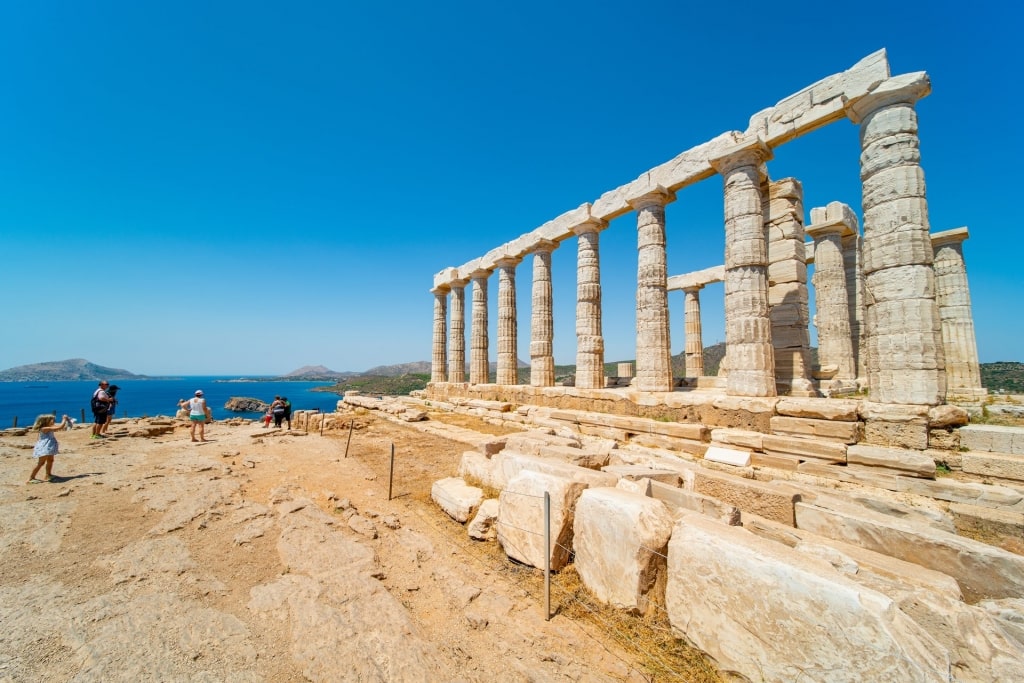
Temple of Poseidon, Cape Sounion
But history in Greece didn’t stop at Athens. One of the most popular day trips from Athens is the Temple of Poseidon at Cape Sounion, a seaside monument built during 444–440 B.C.
The islands also offer generous servings of ancient history: Seek out the Palace of Knossos, Crete’s premier Minoan site, where the legendary Minotaur was said to once roam; Ancient Thira, a lost-in-time city perched on a mountaintop in Santorini; or the Acropolis of Lindos, an ancient citadel in Rhodes.
Indeed, whatever pages from your school history books may have intrigued you—whether it was the exploits of Alexander the Great, the ferocity of Spartan warriors, or something else—rest assured there’s a real-world site to feed your curiosity waiting to be discovered in Greece.
The Birthplace of Democracy
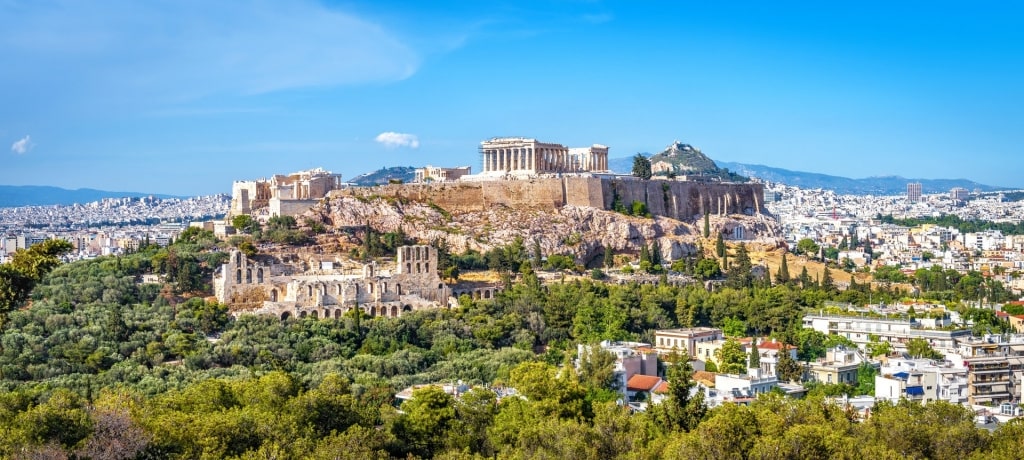
Athens
Greece gave birth to the world’s earliest form of democracy, which remains one of its most enduring gifts to civilization.
This form of self-rule government via direct voting was conjured up around the 5th century B.C., back when Athens was a city-state led by aristocratic rule. Democracy was formed as a novel political system of the time and granted free, male citizens the right to vote.
The legacy of this novel form of government, which roughly translates to “power to the people” continues to live on today in thriving democratic nations around the world, including the United States.
Contemplate how far we’ve come while standing on the Pnyx, the hill where Athenians gathered to vote in the past, and you’ll get some bonus panoramic views of the Acropolis, to boot.
Interesting fact: The concept of a trial by a jury of peers also originated during this era of Greek history.
Mythology
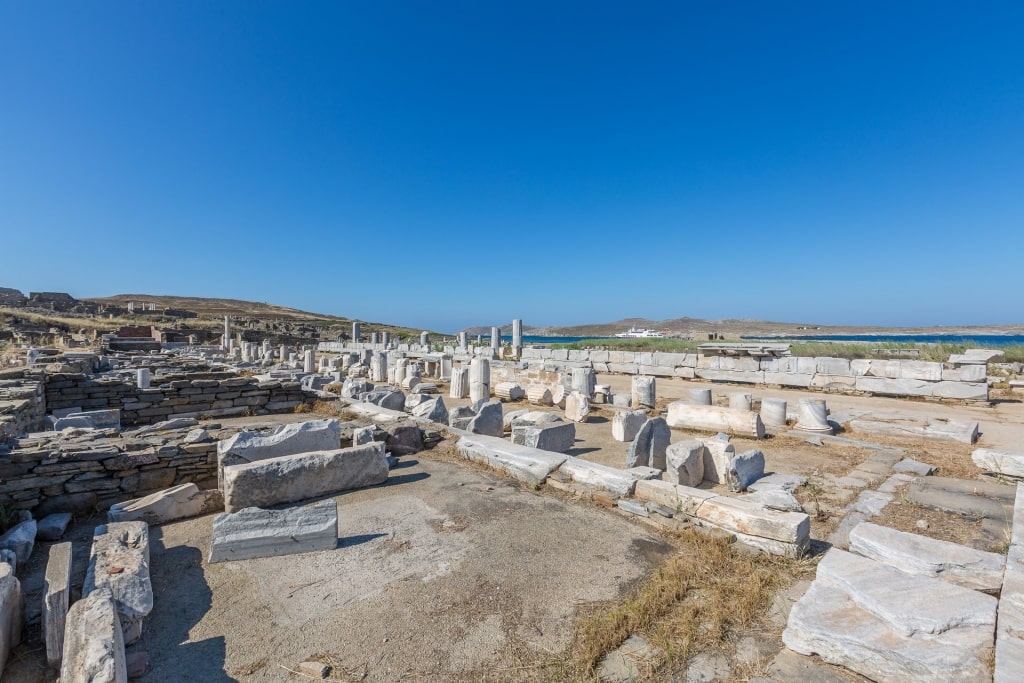
Temple of Apollo, Delos
Thanks to their ageless antics and captivating adventures, many Greek Gods such as Zeus, Athena, Poseidon, and Dionysus remain household names. Catch up with these supernatural beings on their stomping grounds in Greece, where numerous ancient sites are devoted to these ancient Greek gods and goddesses. You’re bound to see their likenesses depicted in museums and temple relics almost anywhere in the country.
For example, the Parthenon stands in tribute to the goddess Athena. A short boat ride from Mykonos, the tiny and sacred island of Delos is said to be the birthplace of the twin gods Artemis and Apollo. And near the Palace of Knossos in Crete, legend has it that is where you’ll find the labyrinth of the minotaur, the half-man/half-bull.
Olympic Games
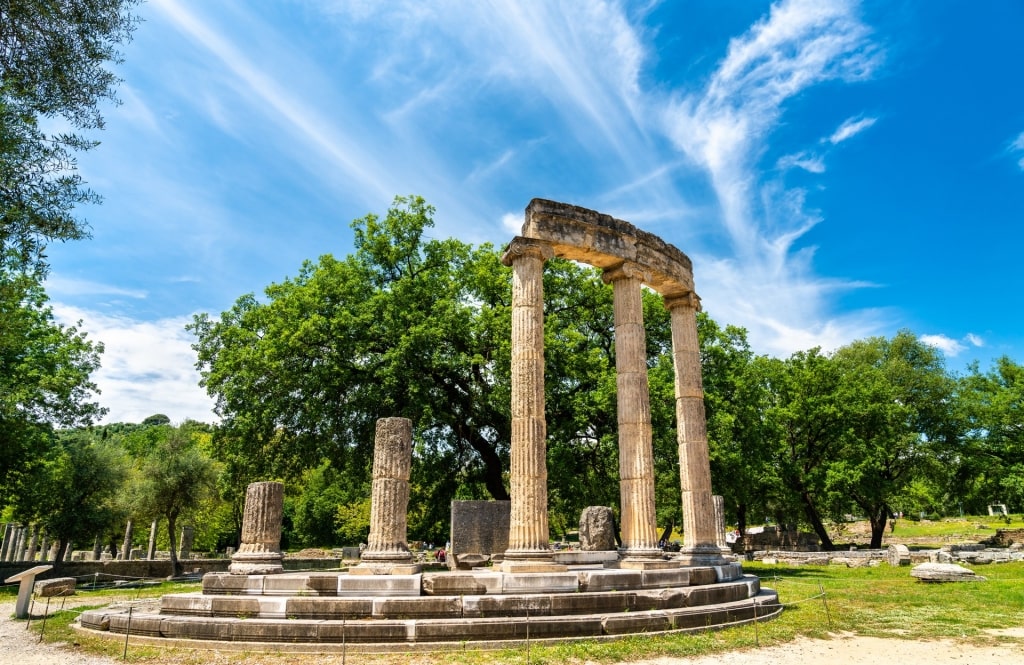
Olympia Archaeological Site, Olympia
Another enduring creation of the ancient Greeks is the Olympic Games, which were founded in 776 B.C. in the spirit of fostering friendly athletic competition in honor of Zeus.
After a centuries-long pause, the modern games were revived in Athens in 1896. Still considered the world’s number one sporting event, the Olympics inspire team spirit and cooperation among people all over the world.
Today, visitors to the Peloponnese can explore the 3,000-year-old ruins at the Olympia Archaeological Site in Olympia, where the games were once held at the base of Kronion Hill, where you can still see relics of an ancient stadium, gymnasium, and dorms.
Bonus trivia: Olympia is where the Olympic flame-lighting ceremony still kicks off the games every four years.
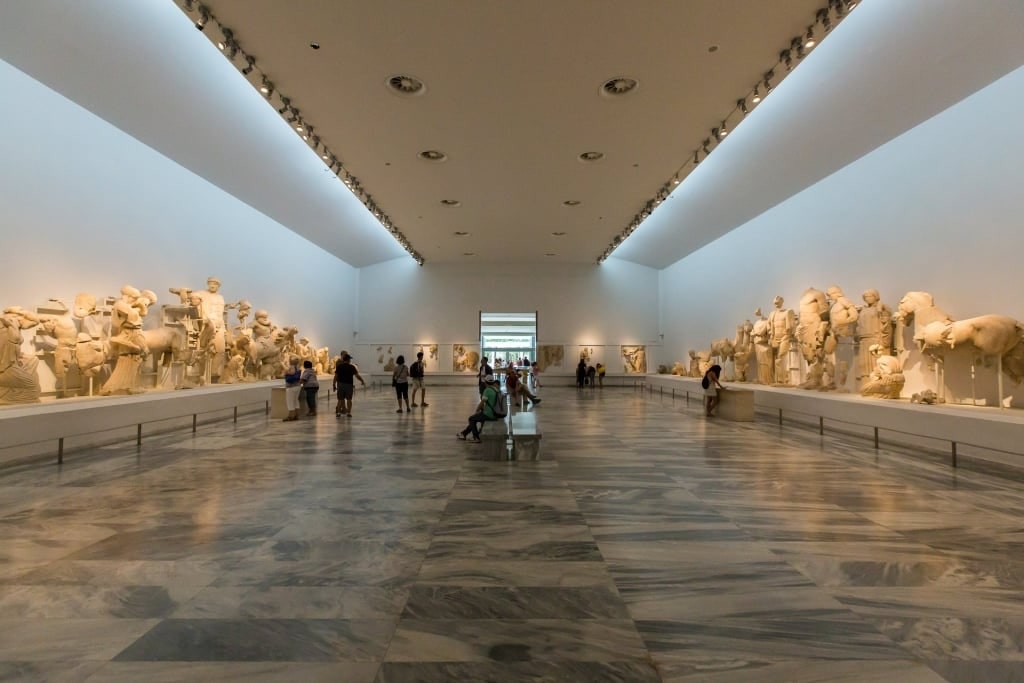
Archaeological Museum of Olympia, Olympia
For more context, the Archaeological Museum of Olympia is filled in with exhibitions showcasing various findings from the surrounding archaeological site.
Beaches
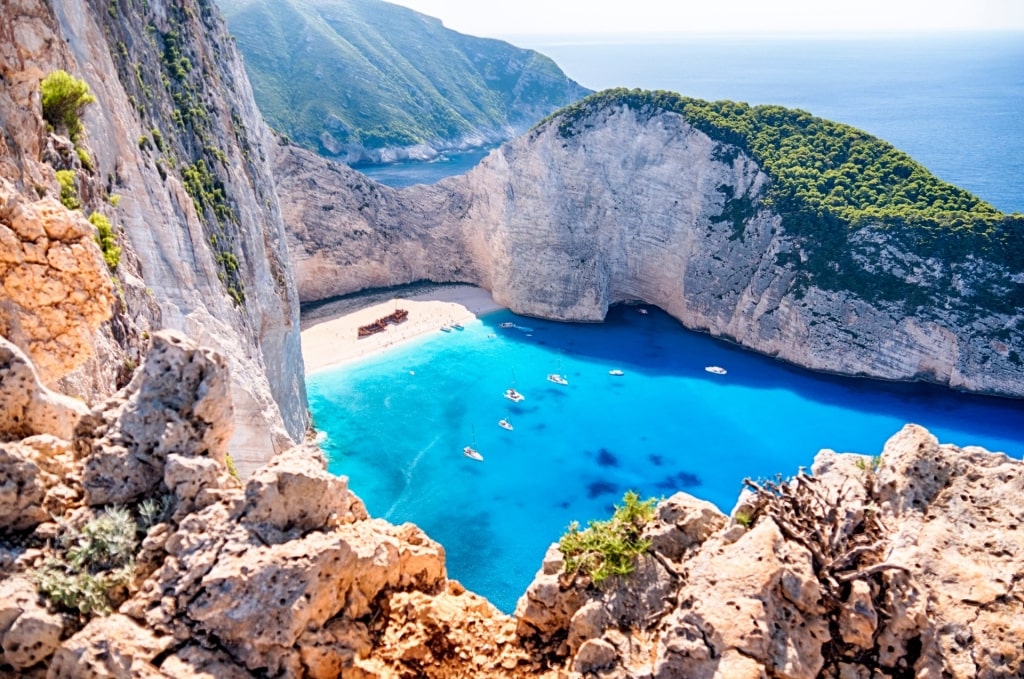
Navagio Beach, Zakynthos
Greece’s thousands of miles of shoreline offer a wide array of picture-perfect beaches to suit all kinds of tastes. Home to some of the best beaches in the Mediterranean, there are options for families with kids, partiers, and those looking for some secluded R&R.
Set off for Santorini’s beaches, where red and black volcanic-sand shores offer unique backdrops to the beach-going experience. Meanwhile, Crete delivers Instagram-worthy pink beaches, if that’s your preferred palette.
And it’s hard to beat Navagio, a.k.a. Shipwreck Beach, on the island of Zakynthos, which has powdery white sands, towering cliffs, and iconic wrecked ship on its shore—it’s no surprise Navagio is regularly ranked among the best beaches in the world.
Wherever you go, Greeks know how to do beach time, so rest assured that you’ll find sunbeds, umbrellas, watersports, and seaside tavernas to cater to your every sun-soaked whim.
Islands
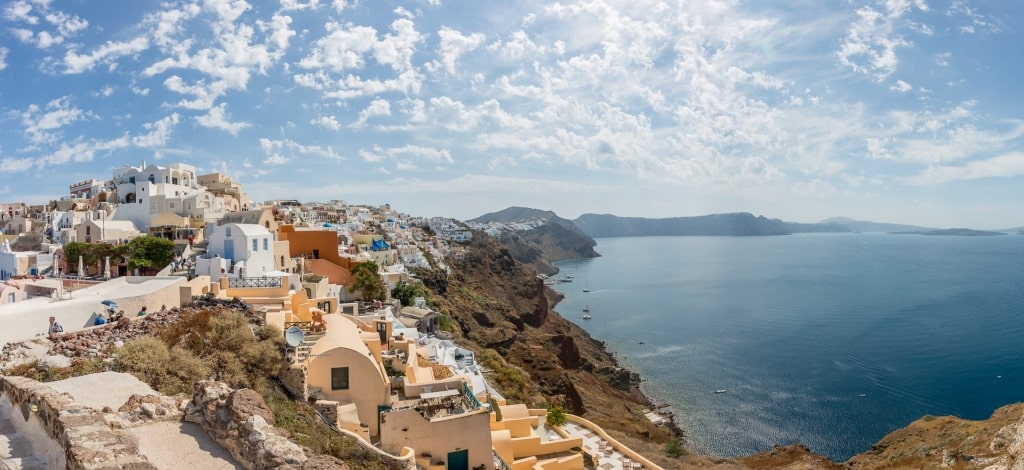
Oia, Santorini
Speaking of beaches, many of Greece’s most gorgeous stretches of sand unfold over its 6,000 islands, though only about 200 of them are inhabited. These idyllic destinations are what Greece is known for and are considered the jewels of the Aegean, Mediterranean, and Ionian seas.
Some of the surefire standouts include Santorini, which is celebrated for its spectacular setting atop a cliff perched over a volcanic caldera, where the sunsets are nothing short of sublime. Mykonos is another classic, known for its white-washed architecture, lively beaches, and pulsating nightlife scene.
Read: 18 Gorgeous Beaches in Mykonos
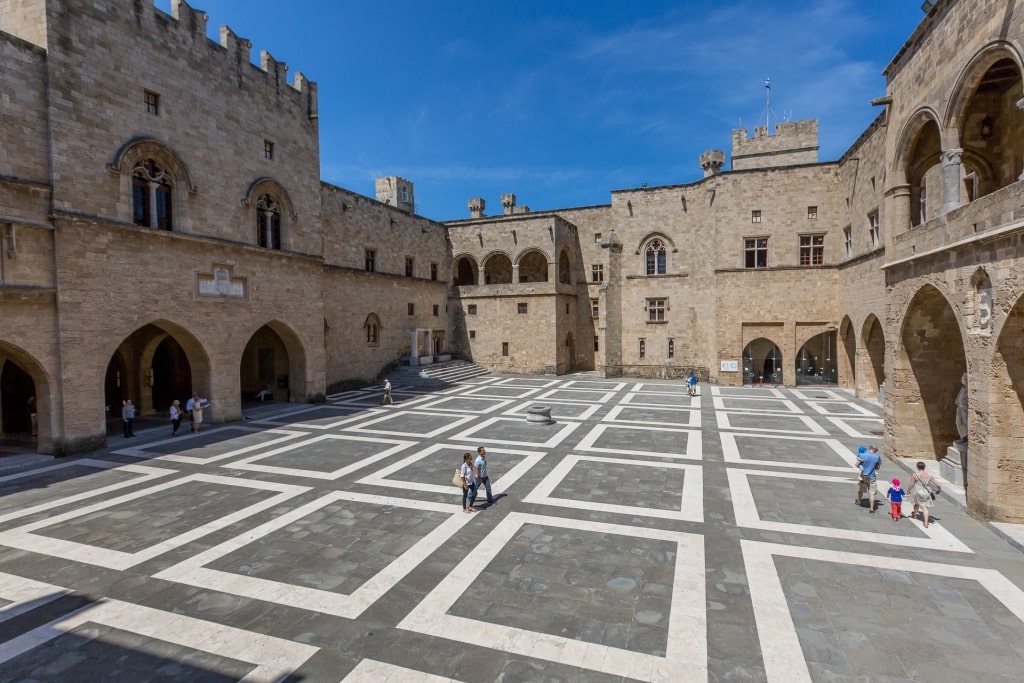
Palace of the Grand Master of the Knights, Rhodes
Look to Rhodes for its perfect mix of medieval castles, ancient ruins, beaches, and nightlife. Massive Crete, meanwhile, with its mountains-meet-the-sea terrain features ancient ruins along with its natural attractions, such as Europe’s longest gorge. And, don’t forget lush, Italian-influenced Corfu, loved for its white-sand beaches and happening nightlife.
Can’t pick just one? No problem: Greek island-hopping is a popular vacation pastime with plenty of transportation options that make the task of going from one isle to the next a breeze.
Food and Drink

Souvlaki
It’s no surprise that Greeks know how to eat. Whether grabbing a souvlaki kebab from a street-side stand, tucking into a casual meal at a family-run taverna, or indulging in haute cuisine at a high-end restaurant, rest assured that Greek restaurateurs of all stripes place a high value on serving a quality meal.
Given all those coasts and islands, you can be sure that seafood dishes feature high on the menu, with grilled, fresh-caught fish and octopus aplenty. Lamb is another major staple, as are national dishes like moussaka, which features eggplant, ground meat, and cheese, and pastitsio, a lasagna-like meal based on ground beef.

Olives and feta cheese
Olives, including olive oil, is what Greece is known for, while cheese is another huge part of the diet. Sheep’s milk-based feta—which sometimes features goat’s milk—is most famous, but also seek out kasseri, a semi-hard sheep’s milk cheese; or saganaki, which is a cheese that’s fried in a pan.
If you need a quick breakfast or snack on the go, savory phyllo pies are just the ticket: try tiropita, which is filled with cheese, and spanakopita or Greek spinach pie. And starters, or meze, typically include a spread of dips and salads that can precede a meal or stand on their own. Don’t miss the yogurt-based tzatziki sauce, which mixes garlic and cucumber.

Baklava
Round it all out with baklava or galaktoboureko, two favorite Greek desserts, which are both based on phyllo dough.
Just keep in mind that Greece has a late-dining tradition. Eating dinner at 10:00 p.m. is the norm, though there are a good amount of eateries that cater to tourists long before then.
Greece also has some excellent wines and don’t leave town without sampling anise-flavored ouzo, the national drink. Just be prepared—the liquor is potent.
Perfect Weather

Kalafatis Beach, Mykonos
As if Greece didn’t have enough to lure you in, it’s been blessed with a wonderfully warm and sunny climate, too. While winters can get chilly—it’s not unheard of to see snow in Athens—and midday summers can be scorchingly hot where temperatures can break 100 °F, almost everything in between those two extremes is pleasant and welcoming.
The country averages some 250 days of sunshine a year, allowing you to make the most of your time on the beach or while taking in the sites.
Read: Where to Go This Summer
Hospitality
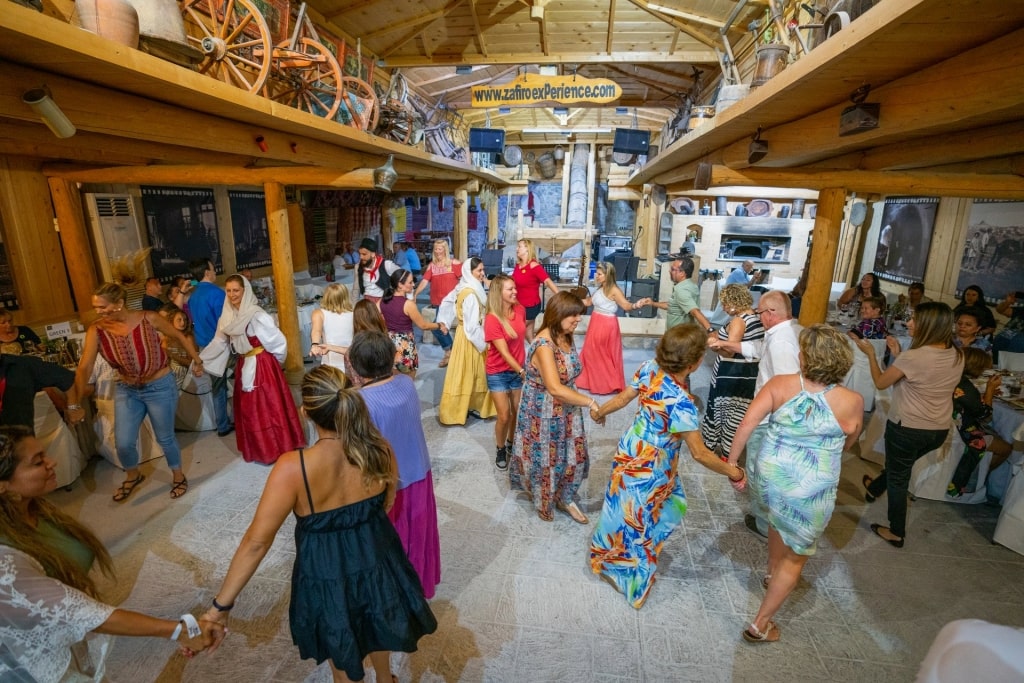
Athens
Due to its many treasures, Greeks have become experts at welcoming travelers to their gorgeous country. In fact, one out of 10 Greeks works in the tourism industry and they are known around the world for their high level of hospitality.
The Greeks even have a special word to capture their spirit in regards to tourists: “philoxenia,” which roughly translates to a “love of foreign visitors.” It’s little wonder that this ideology is part of the Greek ethos, as even Zeus himself was once worshiped as a protector of foreigners.
Read: 7 Days in Greece
Ready to find out firsthand what Greece is known for? Discover the best of this magical destination on one of Celebrity’s Greek island cruises.
Set sail to Athens, Santorini, Mykonos, and more on a dreamy Greek islands cruise vacation. Browse itineraries on our website and book your Greek cruise vacation with Celebrity Cruises today.
